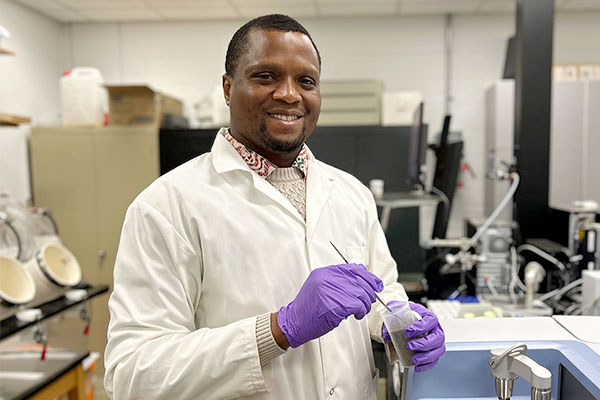Program
Tackle global challenges like climate change, food security, and environmental restoration through innovative soil science. At the University of Saskatchewan, you'll join a globally recognized department leading field-based, landscape-scale research to understand and restore ecosystem health across terrestrial and aquatic environments.
Why choose USask for Soil Science?
- Internationally recognized for field-based, landscape-scale research that links micro-scale science to real-world environmental issues.
- Specialize in diverse high-impact areas critical to global sustainability.
- Collaborate across USask, Canadian universities, and government agencies like Agriculture & Agri-Food Canada and Environment Canada.
- Access advanced tools and facilities, including synchrotron technology and UAV sensing
Quick facts
-
Expected Length Thesis-based Course-based M.Sc. 2 years Ph.D. 4 years - Degree requirements
- Class delivery in-person
- Supervisor approval is recommended before applying
- Deadlines and admission details below
Gamechangers in soil and sustainable ecosystems
From prairie soils to arctic landscapes, explore the processes that sustain ecosystem health and resilience. Your research will drive solutions for climate adaptation, food security, environmental restoration, and sustainable land use, impacting communities and policy across Canada and beyond.
Soil Sciences Master's and Ph.D. research areas

USask’s Soil Science department is a global leader in field-based, landscape-scale research. Faculty and students investigate soil’s role in terrestrial and aquatic ecosystem health, integrating soil, topography, and environmental factors to better understand and restore ecosystem function.
Key research areas:
- Soil Quality and Water: exploring soil’s influence on water, nutrients, and biodiversity through biogeochemical cycling, hydrology, and microbial ecology.
- Climate Change: advancing soil’s role in climate resilience through land use modeling, carbon
storage, and greenhouse gas mitigation using UAVs, digital mapping, and dendrochronology - Risk Assessment and Innovative Treatment Technologies: assessing contaminants like hydrocarbons, heavy metals, and herbicides and developing site-specific treatments using ecotoxicology, native plants, and sustainable amendments.
- Food and Energy Security: enhancing agroecosystem sustainability through research on herbicide-soil interactions, nutrient stewardship, herbicide interactions, bioproducts, and resilient cropping systems.
Research supervisors
Before applying, we recommend contacting a potential supervisor whose research areas align with your interests. Share your academic background and research goals. If they are accepting students, they will instruct you to begin a formal application.
| Name | Research areas |
|---|---|
| Soil biology, protist diversity and systematics, soil micro-invertebrates, nutrient cycling, food webs, community structure, microbial ecology | |
| Soil biogeochemistry, root-soil relationships, stable isotopes, rhizosphere processes | |
| Applied pedology, Soils and global change, Wetland soils, Digital soil mapping | |
| Cropping systems research, crop rotations, agronomy, crop physiology, sustainable agriculture, interdisciplinary studies | |
| Digital Pedology, Remote Sensing, Soil Carbon Dynamics, Soil Salinity, Prairie Wetland Management, Soil Data Management | |
| Nutrient supply, agroecosystem capacity and integrity, soil resources, environmental agronomy, green house gas emissions | |
| Soil microbiology, Microbial ecology, Plant root-microbe interactions, Soil organic matter, Soil nutrient cycling, ... | |
| Plant mineral nutrition, Ion transport, Tolerance and adaptation to soil-based abiotic stresses, Root architecture, Root microbiome | |
| Past and future climates in Canada in relation to dynamic ecosystem and geomorpholgical processes; Dendrochronology and dendrochronological techniques | |
| Using synchrotron radiation to perform phosphate speciation in soils, oxyanion bonding mechanisms, spectroscopy of metal-ligand complexes | |
| Nutrient cycling and management, soil fertility and fertilizers, soil conservation and land use, cropping systems, herbicide fate in soil | |
| Soil water dynamics, thermal regimes in non-level landscapes, hydrophobicity of soil materials, soil water storage capacity | |
| Soil ecotoxicology, investigation of trace contaminant effects in northern terrestrial ecosystems using molecular tools | |
| Herbicide persistence and toxicity in northern soils and vegetation; Soil amendment technology and practices for remediation and restoration... | |
Tuition and funding
Funding
All students accepted into the graduate program receive financial support from their supervisor’s research funds and/or scholarships. To be eligible for scholarship funding, students must have obtained at least 80% in the last two years of study. Scholarships are awarded on a competitive basis and are not guaranteed.
Students cannot undertake graduate work without financial support; thus, the supervisor must write a letter stating that he/she will provide the financial support and other resources necessary for you to complete your program. This letter is required before a recommendation can be made by the Department to the College of Graduate and Postdoctoral Studies (CGPS) for student acceptance.
All students registered in thesis-based graduate programs within departments in the College of Agriculture and Bioresources receive a minimum level of funding at the beginning of their programs. Students are also eligible to receive other funding (e.g. scholarships and employment) in addition to these levels.
The minimum funding levels are as follows:
* This is a college-level minimum duration and annual funding level. The department-specific minimum levels may be greater than these. Consult the department websites available here.
Any questions about the minimum levels of funding and durations can be directed to danielle.baron@usask.ca.
Graduate students at USask can receive funding from a variety of sources to support their graduate education.
Tuition and fees
Graduate students in a thesis or project-based program pay tuition three times a year for as long as they are enrolled in their program.
| Program | Canadian students | International students |
|---|---|---|
| Master of Science per term |
Student fees
In addition to tuition above, students also pay fees for programs like health and dental insurance, a bus pass, and other campus services. The amount you need to pay depends on if you are taking classes full time or part time, and if you are on campus or not. The table below assumes you are on campus full-time.
| Fall 2025 | Winter 2026 | Spring 2026 | Summer 2026 | |
|---|---|---|---|---|
| Student fees | $578.45 CAD | $804.73 CAD | $36.75 CAD | $36.75 CAD |
Tuition information is accurate for the current academic year and does not include student fees. For detailed tuition and fees information, visit the official tuition website.
Doctoral students pay tuition three times a year for as long as they are enrolled in their program. Both international and domestic Ph.D. students pay the same rate.
| Program | Canadian students | International students |
|---|---|---|
| Doctor of Philosophy per term |
Student fees
In addition to tuition above, students also pay fees for programs like health and dental insurance, a bus pass, and other campus services. The amount you need to pay depends on if you are taking classes full time or part time, and if you are on campus or not. The table below assumes you are on campus full-time.
| Fall 2025 | Winter 2026 | Spring 2026 | Summer 2026 | |
|---|---|---|---|---|
| Student fees | $578.45 CAD | $804.73 CAD | $36.75 CAD | $36.75 CAD |
Tuition information is accurate for the current academic year and does not include student fees. For detailed tuition and fees information, visit the official tuition website.
Admission requirements
- Language Proficiency Requirements: Proof of English proficiency may be required for international applicants and for applicants whose first language is not English
- A cumulative weighted average of at least a 70% (USask grade system equivalent) in the last two years of study (i.e. 60 credit units)
- A four-year honours degree, or equivalent, from a recognized college or university in an academic discipline relevant to the proposed field of study
- Language Proficiency Requirements: Proof of English proficiency may be required for international applicants and for applicants whose first language is not English
- Master’s degree, or equivalent, from a recognized university in a relevant academic discipline
- A cumulative weighted average of at least a 70% (USask grade system equivalent) in the last two years of study (i.e. coursework required in master’s program)
Application process and deadlines
Deadlines and important dates
Applications are accepted on a year-round, continual basis with no application deadline. Students may begin their program in January, May or September each year.
Submit an online application
International Students - Review federal international study permit policies before you apply. We do not anticipate that the implementation of the PAL process will limit graduate enrollment at USask.
Before beginning your online application, be sure that you have carefully reviewed all program information and admission requirements on this page.
During the application, you'll be asked for:
- Personal information such as your name, address, etc.
- Contact information of your three referees
- For your letters of recommendation, two of your referees must be academic contacts, and the third may be academic or professional
- Your complete academic history from all previous post-secondary institutions
The application takes about 30 minutes to complete. You may save your application and return to it later.
At the end of the application, you will need to pay a non-refundable application fee: $125 for domestic students and $145 for international students. Your application will not be processed until payment is received.
Submit required documents
Once you've submitted your online application, you will have access to upload your required documents, and provide the contact information for your references. To do this, go to the "Supplemental Items & Documents" tab in your application.
Preliminary Statement of Marks
- Once you have submitted your application for admission and paid the application fee, you will be required to upload unofficial PDF copies of your academic transcript(s) from each post-secondary institution attended. This requirement will appear as Preliminary Statement of Marks or Additional Prelim. Statement under admission requirements on your Application Summary when you check your application status.
- The uploaded transcript can be an unofficial copy of the transcript issued by the university or college and must include a grading key/legend.
- All pages of a transcript must be uploaded as a single PDF document.
- Uploaded transcripts will be considered unofficial or preliminary. Official copies of your transcripts will be required only for applicants offered admission. This requirement will appear as Post-secondary Transcript under admission requirements on your Application Summary when you check your application status.
- Transcripts in languages other than English must be accompanied by a certified translation.
For students who are required to provide proof of English proficiency:
- Completing a relevant test with the appropriate score is required before the application deadline.
- Tests are valid for 24 months after the testing date and must be valid at the beginning of the student's first term of registration in the graduate program.
- Applicants will be required to upload a PDF copy of any required language test score. Uploaded test scores will be considered unofficial or preliminary.
You may be required to submit the following documents:
- A curriculum vitae or resume
- A statement/letter of intent
Contact

Department of Soil Science
51 Campus Drive
University of Saskatchewan
Saskatoon, SK S7N 5A8
Graduate Chair
Katherine Stewart
Email: katherine.stewart@usask.ca
Graduate Administrator
Shahrima Tahsin
Email: soilsc.gradstudies@usask.ca
- Department of Soil Science
Learn more about the academic unit offering this program - Program and Course Catalogue
To view official admission and program requirements

